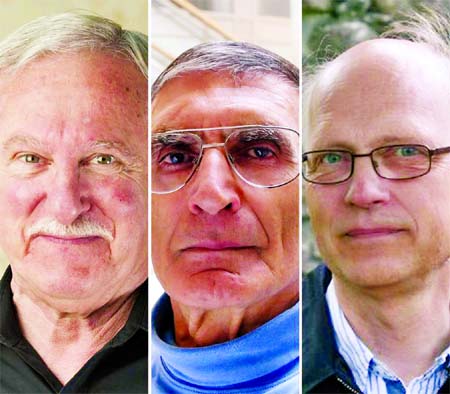
Reuters, STOCKHOLM, LONDON :
Three scientists from Sweden, the United States and Turkey won the 2015 Nobel Prize for Chemistry on Wednesday for working out how cells repair damaged DNA, providing new ammunition in the war on cancer.
Detailed understanding of DNA damage has helped drive a revolution in cancer treatment as researchers develop new drugs that target specific molecular pathways used by tumor cells to proliferate.
Tomas Lindahl, Paul Modrich and Aziz Sancar won the prize for “mechanistic studies of DNA repair”. Their work mapped how cells repair deoxyribonucleic acid (DNA) to prevent damaging errors from appearing in genetic information.
In many forms of cancer, one of more of these repair systems is damaged.
“Their work has provided fundamental knowledge of how a living cell functions and is, for instance, used for the development of new cancer treatments,” the Royal Swedish Academy of Sciences said.
Thousands of alterations to a cell’s genome occur every day due to spontaneous changes and damage by radiation, free radicals and carcinogenic substances – yet DNA remains astonishingly intact.
To keep genetic materials from disintegrating, a range of molecular systems monitor and repair DNA, in processes that the three award-winning scientists helped map out.
“It’s important for cancer prevention and cancer treatment. That is what I received it for,” Sancar, who has U.S. and Turkish citizenship and is a professor at the University of North Carolina, told Reuters by telephone from his home.
“I’ve done significant work to deserve the prize but I was not expecting it this year. I wasn’t even aware that I was nominated.”
Sancar, who said he had been inundated by calls, added that his immediate plans were to shower, shave and go to his lab.
Lindahl, who works at Britain’s Francis Crick Institute and Clare Hall Laboratory, said he was surprised by the news, although he knew he had been considered for a prize over the years, along with “hundreds of other people”.
He said DNA repair played a vital role in human health and the work by Nobel trio over the years was important in pointing the way to better disease treatments, especially for cancer.
“We have to understand the mechanisms, so we can selectively provide good therapy,” he told the Nobel news conference by telephone from London. “We can’t avoid DNA damage. We live in a world where we get exposed to DNA damaging agents all the time.”
Modrich, the third winner, is a researcher at the Howard Hughes Medical Institute and Duke University School of Medicine in the United States.
Chemistry was the third of this year’s Nobel prizes. The prize is named after dynamite inventor Alfred Nobel and has been awarded since 1901 for achievements in science, literature and peace in accordance with his will.
The prize for medicine was awarded on Monday for work in developing drugs to fight parasitic diseases, while the physics prize went to researchers investigating ghostly sub-atomic particles known as neutrinos.

